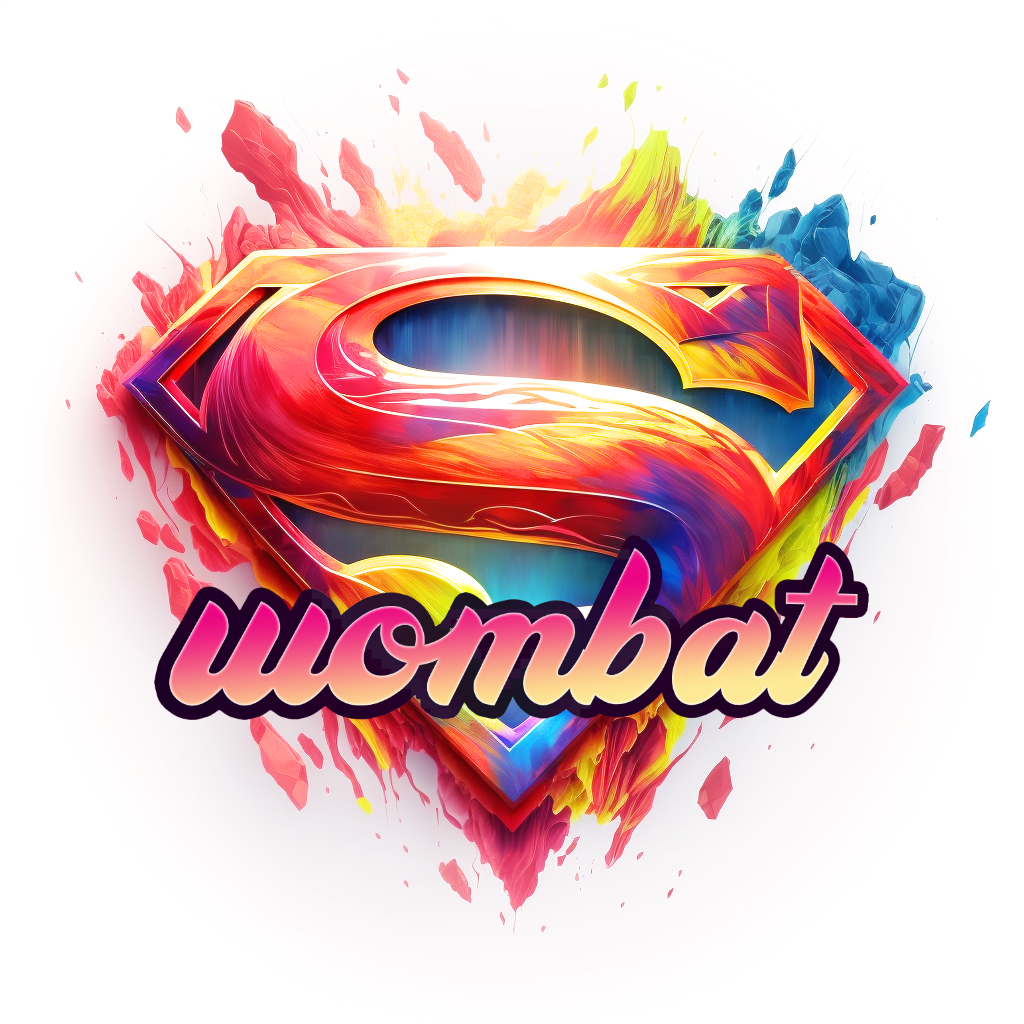Let’s take down another sacred monster in the NFT space.
Community.
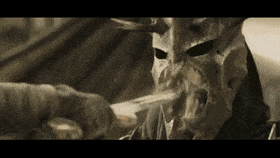
It’s the best of things, and it’s the worst of things.
Mostly, the word is waved around as a trap for fools. Sometimes those waving it genuinely believe it means something. Often they are wrong.
There’s a whole raft of misunderstandings attached to this word, so let’s take them down one by one, because trying to fight them all at once will get nowhere fast.
First let’s address the literally biggest misconception about community in web3: the idea of “the web3 community”.

It’s a common human habit to try to simplify large and complicated things into more manageable concepts. That’s fine so long as we don’t forget about the simplification, but often in web3 that simplification is either deliberately or carelessly ignored.
There is no such thing as “the web3 community”.
Like all Big Things, web3 is:
- huge
- fragmented
- contradictory
- pulling in multiple directions at once
- not led by anyone
- not subscribing to a single philosophy
- just a fricken mess.

Every once in a while, I see tweets of people getting frustrated that “the web3 community” isn’t doing what they thought it “should” do.
This frustration is unnecessary. It’s like getting frustrated at the ocean for not producing the waves you want to see.
Some people are into web3 purely for profit (though many of those have taken a break rn). Some are into web3 for art. Some for tech. Some to change the world. Some to build a biz. Some to steal. Some to expand their biz. Some just for lols. Some because it looks like fun for now.
Everyone who is in web3, is here for their own unique sets of reasons, which not only may not match yours, but may pull in the very opposite direction.
Nobody owns the term web3, so even ppl who want crypto to be replaced by panopticon CBDCs could claim to be “in web3”.

It’s a fucking mess. So there’s no point in getting worked up when “the community” doesn’t behave the way you want. When “some people” are not living up to the ideals that you’ve projected onto this mirage that you call “the community”.
There’s no coherent “web3 community”.
Next, let’s address the “community” narrative that’s often found in NFT projects.
By now it’s hardly controversial to point out that the projects that yell the loudest that they’re “all about giving back to the community” are usually anything but.

It’s a bald-faced lie, but everyone who joins those bullshit projects thinks they’ll manage to squeeze some profit out of them before the others, so they go along with it.
Nobody wants to be the party pooper who points out there’s no community, only a vortex of individual greed.
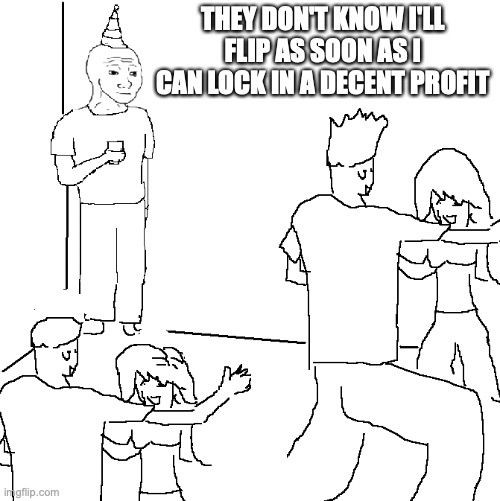
Now, that’s not true of all projects. But it’s true of most.
In my experience, the projects that actually are trying to build a community, whatever that means to them, are not shouting about it every day. Instead, they’re working hard to become a nice place to hang out.
Many “bluechip” projects were supposed to be safe because of the “strength of their community”.
But let’s be real here: a community where ppl are holding a membership token mostly because they want to make a profit is a ticking time bomb.
Eventually, most ppl are going to cash in and leave, because it makes financial sense, and the “strength of the community” will slowly but surely bleed away.
And the new ppl entering “the community” will have a different price point, different expectations, no history, etc.
Every time an ape gets sold, BAYC’s community gets more diluted.
Lots of apes are sold every week. Do the math yourself. The “community” is rotating itself out of existence.
Unless there’s some REALLY good reasons to stick around, NFT-based communities can’t survive.
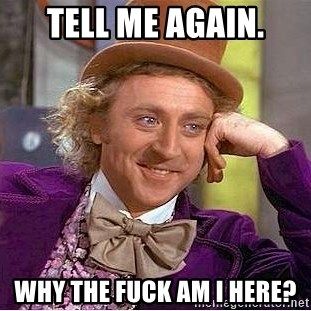
And most “community”-driven NFT projects have nothing but ponzinomics and “community” vibes propping them up.
So they’re basically dead by design.
The NFT was just the “community”‘s ponzi heart that enabled profit taking. It hastened its own inevitable demise.
I’ve been in many online communities over the years. Message boards back in the 90s… IRC channels… social news… FB groups… and ofc Discords and all that jazz.
Almost all of them were free and token-less. They nevertheless lasted for years, and were enjoyable.
There was a reason to hang out in those communities. In one, I was learning web design, then later just hanging out with friends. In another, I learned miniature painting. Another was a trove of startup knowledge. Or programming knowledge.
Most of the “NFT communities” that exist at the moment have no reason to exist beyond the profit motive. They may claim they have, but almost everyone is basically there in hope that price-go-up and they make a profit.
Then they’re probably walking out.
You know it’s true.
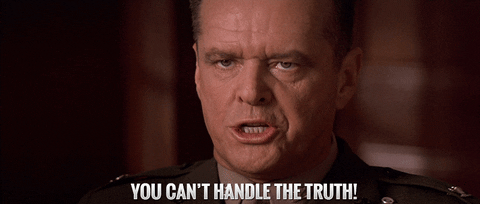
You can analyse your own portfolio for yourself quite simply: for any project where you’re “in the community” – would you still spend as much time there without a token?
Would you pay a monthly fee to be there?
This last question will highlight the highest-value communities.
If you had to pay $10/m to stay in the “communities” you’ve joined and there was no token… which would you pay for and why?
There’s gold in them there hills.
As a final nail in the coffin of the community thesis, there’s a truism in investments that “narrative follows price”. It’s conveniently been forgotten in NFTs. But it still holds:
Community narrative follows price.
A rapidly rising price will generate an ecosystem of stories about how visionary the project is and, of course, how strong the community is.
It’s kinda true because everyone there is excited to make money.

Until people start selling. Then the story starts cracking.
Some few ppl are trying to solve this by designing their communities differently, shoehorning the flawed “PFP community” concept BAYC pioneered into the creation of an actually long-term viable community.
But most dgaf. They’re happy to ride the wave & collect $ while they can.
See through their empty words: community is just a flashy sticker they put on their empty project as a way to make it sound good.
The bigger that sticker is, the more suspic
ious you might want to be.
A third way that “community” is misused is with the pretence that “community” gets anything done.
I ran a decentralised-management company for years. There was a saying we stole from @HolacracyOne:
“We” never gets anything done.
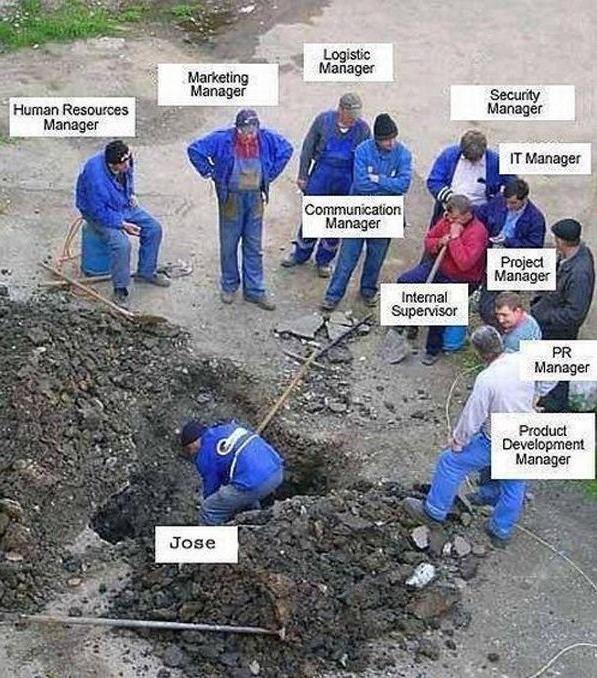
Everything that ever gets done, gets done by individuals who decide “I’m going to do this thing now”. Maybe they get others involved, inspired, motivated, recruited… but it always starts with a single person rolling up their sleeves and getting shit done.
I’ve lost count of the number of abjectly useless NFT founders who have “handed the project over to the community” as a massive and dishonest cop-out, a way to cover up the fact that, having taken out all the money they could, they’re just fleeing the sinking ship.

Less dishonestly, many first-time founders make the mistake (I did) of trying to pass difficult decisions onto “the community”, whether ethical or strategic.
Sorry folks: if you’re the founder, you’re gonna have to put on your big boy/girl/enby pants and Make The Decisions.
It’s ok that you don’t know what you’re doing. You’re not alone. Nobody who runs a business knows what they’re doing. It’s part of the fun.
So roll up your sleeves and tackle those tough strategic and ethical decisions yourself. Get help, get advice, then make the call.
“The community” can’t help. Half the time, they’re just going to vote for what they think you want. The other half of the time, they’ll make proposals so nakedly self-serving that you might throw up in your mouth.
The wisdom of crowds doesn’t mix well with short term greed.
If you want to build something that has long term potential, listen to people, sure, but stop abdicating your responsibilities to “the community”.
And if you see first time founders doing that, nudge them to build the courage to make the calls they need to make.
Is there anything good about the term “community”? Surely it must point to something useful as well, even if it is being abused endlessly in the web3/crypto space?
After all, I started off calling it the “best of things”.

A relevant dictionary definition of “community” is:
a social, religious, occupational, or other group sharing common characteristics or interests and perceived or perceiving itself as distinct in some respect from the larger society within which it exists.
Usually communities are geographically local, but the for decades now the internet has enabled communities to thrive online. Web3 has not actually added all that much to this picture, other than the “get rich quick online” aspect, afaict.
Web3 has, however, provided a point of focus for communities to form. Many points of focus, actually, some better than others.
The epic ponzi wave of the last 18 months was a point of focus that drew in a lot of ppl looking to trade their way to instant riches.
I’m not so keen on that particular focus, as you probably know if you read my threads, but there are others too.
Web3 has points of focus on global freedom and inclusivity, on creating a future worth living in, on art, generative or not, on innovation.
For reasons I don’t understand yet, it has also drawn a higher than usual proportion of people who care about mental health – both their own and each other’s.
Perhaps a lot of people in web3 are not neurotypical, so it makes it a supportive space for the neurodivergent.
These points of focus draw people to them. Communities can form around those, driven not by tokens but by common interest. They can exist without tokens, and can last far beyond them. Bonds can form between people that are much more robust than any smart contract or blockchain.
In my view, the best of “community” in web3 is this network of connections that is forming globally, composed of all manners of misfits and miscreants and troublemakers (in a good way) who want to make the world a better place. The ppl Steve Jobs called the Crazy Ones.
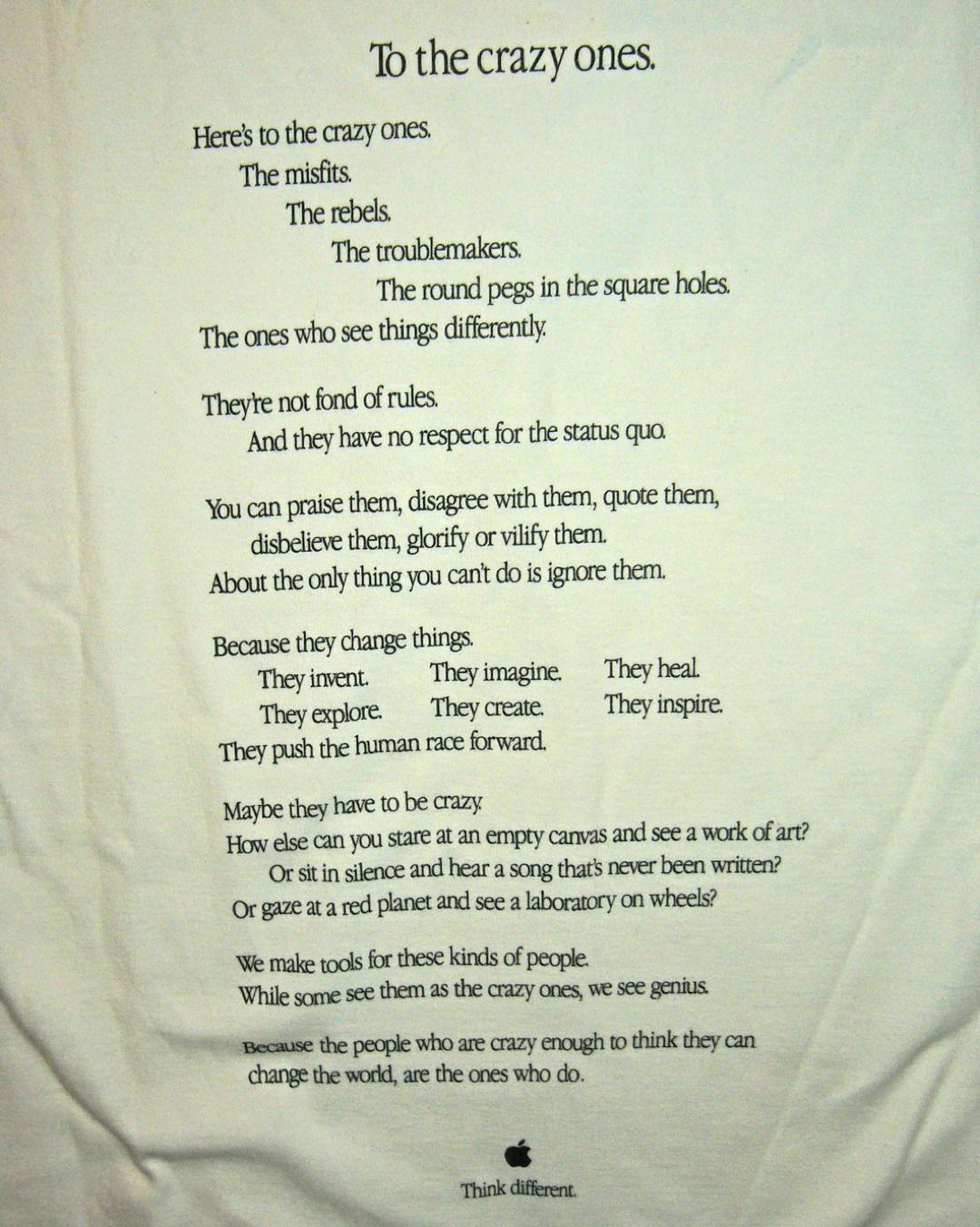
50 years ago, the Crazy Ones were drawn to computer clubs, and they changed the world.
Who would have thought, 50y ago, that hanging out with a 22 year old geek called Steve Wozniak was an incredible honour, that you were in the presence of someone who would change the world?
Well, some people did get it. The people who were in that community at the time. They weren’t there to chase riches. They were there because they were really passionate about the tech, about building the future, about chasing their dreams down this new path.
Today, the Crazy Ones have converged on web3.
And because web3 is multifaceted and pretty big already, there are many such groups of passionate people connecting and building friendships in this space, around art, or tech, or social impact, or many other endeavours.
These are communities worth showing up for.
Not because they will make you financially wealthy. Not because they distribute tokens that keep the ponzi flowing and give you a chance of “making it” by winning some obscure and most likely rigged lottery.
But because maybe you’re also one of the Crazy Ones, crazy enough to think you can make a ding in the world. Crazy enough to even want to. To dare to have that desire.
There’s room for more in these communities.
Let’s change the world together. Let’s “make” it.
gm & gl
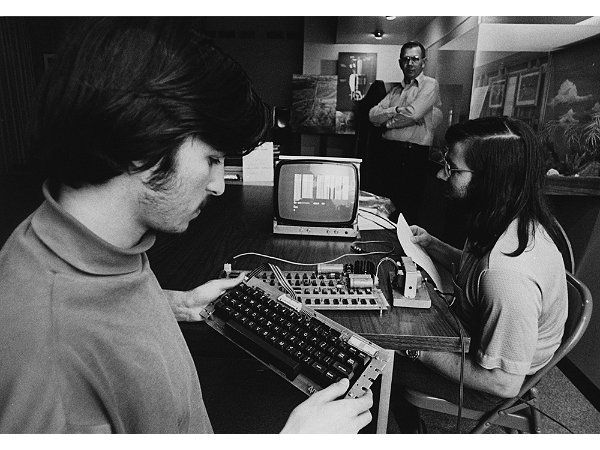
Original Thread:
Let's take down another sacred monster in the NFT space.
Community.
It's the best of things, and it's the worst of things.
Mostly, the word is waved around as a trap for fools. Sometimes those waving it genuinely believe it means something. Often they are wrong.
— Daniel Tenner (@swombat) August 22, 2022
